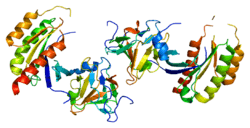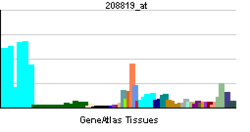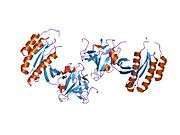RAB8A
| View/Edit Human | View/Edit Mouse |
Ras-related protein Rab-8A is a protein that in humans is encoded by the RAB8A gene.[3][4][5]
Function
The protein encoded by this gene is a member of the RAS superfamily which are small GTP/GDP-binding proteins with an average size of 200 amino acids. The RAS-related proteins of the RAB/YPT family may play a role in the transport of proteins from the endoplasmic reticulum to the Golgi and the plasma membrane. This protein shares 97%, 96%, and 51% similarity with the dog RAB8, mouse MEL, and mouse YPT1 proteins, respectively and contains the 4 GTP/GDP-binding sites that are present in all the RAS proteins. The putative effector-binding site of this protein is similar to that of the RAB/YPT proteins. However, this protein contains a C-terminal CAAX motif that is characteristic of many RAS superfamily members but which is not found in YPT1 and the majority of RAB proteins. Although this gene was isolated as a transforming gene from a melanoma cell line, no linkage between MEL and malignant melanoma has been demonstrated. This oncogene is located 800 kb distal to MY09B on chromosome 19p13.1.[5]
Interactions
RAB8A has been shown to interact with Optineurin[6] and MAP4K2.[7]
References
- ↑ "Human PubMed Reference:".
- ↑ "Mouse PubMed Reference:".
- ↑ Nimmo ER, Sanders PG, Padua RA, Hughes D, Williamson R, Johnson KJ (Aug 1991). "The MEL gene: a new member of the RAB/YPT class of RAS-related genes". Oncogene. 6 (8): 1347–51. PMID 1886711.
- ↑ Huber LA, Pimplikar S, Parton RG, Virta H, Zerial M, Simons K (Oct 1993). "Rab8, a small GTPase involved in vesicular traffic between the TGN and the basolateral plasma membrane". The Journal of Cell Biology. 123 (1): 35–45. doi:10.1083/jcb.123.1.35. PMC 2119815
 . PMID 8408203.
. PMID 8408203. - 1 2 "Entrez Gene: RAB8A RAB8A, member RAS oncogene family".
- ↑ Hattula K, Peränen J (2000). "FIP-2, a coiled-coil protein, links Huntingtin to Rab8 and modulates cellular morphogenesis". Current Biology. 10 (24): 1603–6. doi:10.1016/S0960-9822(00)00864-2. PMID 11137014.
- ↑ Ren M, Zeng J, De Lemos-Chiarandini C, Rosenfeld M, Adesnik M, Sabatini DD (May 1996). "In its active form, the GTP-binding protein rab8 interacts with a stress-activated protein kinase". Proceedings of the National Academy of Sciences of the United States of America. 93 (10): 5151–5. doi:10.1073/pnas.93.10.5151. PMC 39423
 . PMID 8643544.
. PMID 8643544.
Further reading
- Newport J, Roemer MI (Mar 1975). "Comparative perinatal mortality under medical care foundations and other delivery models". Inquiry. 12 (1): 10–7. PMID 123217.
- Nimmo E, Padua RA, Hughes D, Brook JD, Williamson R, Johnson KJ (Mar 1989). "Confirmation and refinement of the localisation of the c-MEL locus on chromosome 19 by physical and genetic mapping". Human Genetics. 81 (4): 382–4. doi:10.1007/BF00283697. PMID 2564840.
- Zahraoui A, Joberty G, Arpin M, Fontaine JJ, Hellio R, Tavitian A, Louvard D (Jan 1994). "A small rab GTPase is distributed in cytoplasmic vesicles in non polarized cells but colocalizes with the tight junction marker ZO-1 in polarized epithelial cells". The Journal of Cell Biology. 124 (1-2): 101–15. doi:10.1083/jcb.124.1.101. PMC 2119893
 . PMID 8294494.
. PMID 8294494. - Joberty G, Tavitian A, Zahraoui A (Sep 1993). "Isoprenylation of Rab proteins possessing a C-terminal CaaX motif". FEBS Letters. 330 (3): 323–8. doi:10.1016/0014-5793(93)80897-4. PMID 8375503.
- Ren M, Zeng J, De Lemos-Chiarandini C, Rosenfeld M, Adesnik M, Sabatini DD (May 1996). "In its active form, the GTP-binding protein rab8 interacts with a stress-activated protein kinase". Proceedings of the National Academy of Sciences of the United States of America. 93 (10): 5151–5. doi:10.1073/pnas.93.10.5151. PMC 39423
 . PMID 8643544.
. PMID 8643544. - Bähler M, Kehrer I, Gordon L, Stoffler HE, Olsen AS (Jul 1997). "Physical mapping of human myosin-IXB (MYO9B), the human orthologue of the rat myosin myr 5, to chromosome 19p13.1". Genomics. 43 (1): 107–9. doi:10.1006/geno.1997.4776. PMID 9226381.
- Wilson AL, Erdman RA, Castellano F, Maltese WA (Aug 1998). "Prenylation of Rab8 GTPase by type I and type II geranylgeranyl transferases". The Biochemical Journal. 333 ( Pt 3) (Pt 3): 497–504. PMC 1219609
 . PMID 9677305.
. PMID 9677305. - Bao S, Zhu J, Garvey WT (Nov 1998). "Cloning of Rab GTPases expressed in human skeletal muscle: studies in insulin-resistant subjects". Hormone and Metabolic Research = Hormon- Und Stoffwechselforschung = Hormones Et Métabolisme. 30 (11): 656–62. doi:10.1055/s-2007-978953. PMID 9918381.
- Shisheva A, Chinni SR, DeMarco C (Sep 1999). "General role of GDP dissociation inhibitor 2 in membrane release of Rab proteins: modulations of its functional interactions by in vitro and in vivo structural modifications". Biochemistry. 38 (36): 11711–21. doi:10.1021/bi990200r. PMID 10512627.
- Hattula K, Peränen J (2001). "FIP-2, a coiled-coil protein, links Huntingtin to Rab8 and modulates cellular morphogenesis". Current Biology. 10 (24): 1603–6. doi:10.1016/S0960-9822(00)00864-2. PMID 11137014.
- Kuroda TS, Fukuda M, Ariga H, Mikoshiba K (Mar 2002). "The Slp homology domain of synaptotagmin-like proteins 1-4 and Slac2 functions as a novel Rab27A binding domain". The Journal of Biological Chemistry. 277 (11): 9212–8. doi:10.1074/jbc.M112414200. PMID 11773082.
- Hattula K, Furuhjelm J, Arffman A, Peränen J (Sep 2002). "A Rab8-specific GDP/GTP exchange factor is involved in actin remodeling and polarized membrane transport". Molecular Biology of the Cell. 13 (9): 3268–80. doi:10.1091/mbc.E02-03-0143. PMC 124888
 . PMID 12221131.
. PMID 12221131. - Fukuda M (Apr 2003). "Distinct Rab binding specificity of Rim1, Rim2, rabphilin, and Noc2. Identification of a critical determinant of Rab3A/Rab27A recognition by Rim2". The Journal of Biological Chemistry. 278 (17): 15373–80. doi:10.1074/jbc.M212341200. PMID 12578829.
- Lau AS, Mruk DD (Apr 2003). "Rab8B GTPase and junction dynamics in the testis". Endocrinology. 144 (4): 1549–63. doi:10.1210/en.2002-220893. PMID 12639940.
- Linder MD, Uronen RL, Hölttä-Vuori M, van der Sluijs P, Peränen J, Ikonen E (Jan 2007). "Rab8-dependent recycling promotes endosomal cholesterol removal in normal and sphingolipidosis cells". Molecular Biology of the Cell. 18 (1): 47–56. doi:10.1091/mbc.E06-07-0575. PMC 1751315
 . PMID 17050734.
. PMID 17050734.


